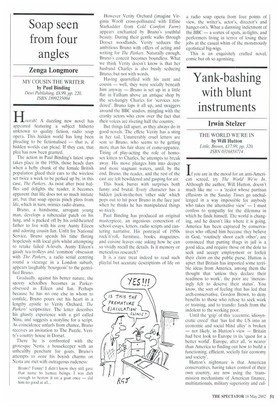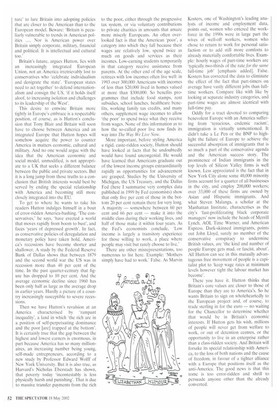Yank-bashing with blunt instruments
Irwin Stelzer
THE WORLD WE'RE IN by Will Hutton Little, Brown, £17.99, pp. 320,
ISBN 0316858714
If you are in the mood for an anti-American screed, try The World We're In. Although the author, Will Hutton, doesn't much like me — a 'zealot whose partisan effusions in the Sunday Times go unchallenged in a way impossible for anybody who takes the alternative view' — I must confess to sympathy for the dilemma in which he finds himself. The world is changing, and he doesn't like where it is going. America has been captured by conservatives who offend him because they believe in God, 'routinely shoot each other', are convinced that putting thugs in jail is a good idea, and require those on the dole to seek and accept employment or forfeit their claim on the public purse. Hutton is upset that Britain has imported some terrible ideas from America, among them the thought that 'unless they declare their readiness to work', the poor are 'increasingly felt to deserve their status'. You know, the sort of feeling that has led that arch-conservative, Gordon Brown, to deny benefits to those who refuse to seek work or training, and to transfer funds from the indolent to the working poor.
Until the 'grip' of this 'eccentric, idiosyncratic creed' that 'has led the US into an economic and social blind alley' is broken — not likely, in Hutton's view — Britain had best look to Europe in its 'quest for a better world'. Europe, after all. 'is nearer than America to finding out how to build a functioning, efficient, socially fair economy and society'.
Hutton's nightmare is that American conservatives, having taken control of their own country, are now using the 'transmission mechanisms of American finance, multinationals, military superiority and cul lure' to lure Britain into adopting policies that are closer to the American than to the European model. Beware: 'Britain is peculiarly vulnerable to trends in American politics .,,. Nor is American power over Britain simply corporate, military, financial and political. It is intellectual and cultural too.'
Britain's future, argues Hutton, lies with an increasingly integrated European Union, not an America irretrievably lost to conservatives who 'celebrate individualism and denigrate the state'. 'European states need to act together' to defend internationalism and consign the US, 'if it holds itself aloof, to increasing isolation and challenges to its leadership of the West'.
This desire to entwine Britain more tightly in Europe's embrace is a respectable position, of course, as is Hutton's conclusion that Tony Blair and Britain will soon have to choose between America and an integrated Europe that Hutton hopes will somehow acquire the power to counter America in matters economic, cultural and military. And no one would argue with the idea that the American economic and social model, unmodified, is not appropriate to a UK that seeks a different balance between the public and private sectors. But it is a long jump from those truths to a conclusion that British interests would best be served by ending the special relationship with America and becoming still more closely integrated into the EU.
To get to where he wants to take his readers Hutton indulges himself in a bout of error-ridden America-bashing. 'The conservatives,' he says, 'have erected a world that moves rapidly from boom to bust', and faces 'years of depressed growth'. In fact, as conservative policies of deregulation and monetary policy have taken hold, America's recessions have become shorter and shallower. A study by the Federal Reserve Bank of Dallas shows that between 1879 and the second world war the US was in recession more than 40 per cent of the time. In the past quarter-century that figure has dropped to 10 per cent. And the average economic decline since 1960 has been only half as large as the average drop in earlier years. Hardly a picture of a country increasingly susceptible to severe recessions.
Then we have Hutton's revulsion at an America characterised by 'rampant inequality', a land in which 'the rich are in a position of self-perpetuating dominance and the poor [are] trapped at the bottom'. It is certainly true that the gap between the highest and lowest earners is enormous, in part because America has so many millionaires, an increasing number being young, self-made entrepreneurs, according to a new study by Professor Edward Wolff of New York University. But it is also true, as Harvard's Nicholas Eberstadt has shown, that poverty today 'incontestably is less physically harsh and punishing'. That is due to massive transfer payments from the rich
to the poor, either through the progressive tax system, or via voluntary contributions to private charities in amounts that amaze more miserly Europeans. An often overlooked fact is that the American 'poor', a category into which they fall because their wages are relatively low, spend twice as much on goods and services as their incomes. Low-earning students temporarily in that category receive assistance from parents. At the other end of the age scale, retirees with low incomes often live well: in 1993 over 300,000 Americans with incomes of less than $20,000 lived in homes valued at more than $300,000. So benefits programmes that include food stamps, rent subsidies, school lunches, healthcare benefits, working family tax credits, and many others, supplement wage incomes to allow 'the poor' to spend twice what they receive from wages. None of this information as to how the so-called poor live now finds its way into The Way We Live Now.
More important, before styling America a rigid, caste-ridden society, Hutton should have looked at facts that he undoubtedly would have found uncongenial. He would have learned that Americans graduate out of the lowest income groups extraordinarily rapidly as opportunities for advancement are grasped. Studies by the University of Michigan, the US Treasury, and the Dallas Fed (here I summarise very complex data published in 1999 by Fed economists) show that only five per cent of those in the bottom 20 per cent remain there for very long. A majority — somewhere between 60 per cent and 66 per cent — make it into the middle class during their working lives, and half of those make it within four years. As the Fed's economists conclude, 'Low income is largely a transitory experience for those willing to work, a place where people may visit but rarely choose to live.'
There are other misrepresentations, too numerous to list here. Example: 'Mothers simply have had to work.' False. As Marvin Kosters, one of Washington's leading analysts of income and employment data, points out, women who entered the workforce in the 1990s were in large part the wives of well-off workers. women who chose to return to work for personal satisfaction or to add still more comforts to already materially comfortable lives. Example: hourly wages of part-time workers are 'typically two-thirds of the rate for the same full-time job' [emphasis added]. False. Kosters has corrected the data to eliminate the effect of the fact that part-timers on average have vastly different jobs than fulltime workers. Compare like with like by looking at separate industry categories, and part-time wages are almost identical with full-time pay.
Oddly for a tract devoted to comparing benevolent Europe with an America suffering from 'tenacious, endemic racism', immigration is virtually unmentioned, It didn't take a Le Pen or the BNP to highlight the failure of Europe to achieve the successful absorption of immigrants that is so much a part of the conservative agenda and the American success story. The prominence of Indian immigrants in the top levels of Silicon Valley firms is well known. Less appreciated is the fact that in New York City alone some 40,000 minority firms account for a quarter of all businesses in the city, and employ 200,000 workers; over 33,000 of these firms are owned by Asian and Hispanic immigrants. And what Steven Malanga, a scholar at the Manhattan Institute, characterises as the city's 'fast-proliferating black corporate managers' now include the heads of Merrill Lynch, AOL Time Warner, and American Express. Dark-skinned immigrants, points out John Lloyd, surely no member of the conservative conspiracy to undermine British values, are 'the kind and number of people Europe gets mad, or fascist. about'. All Hutton can see in this mutually advantageous free movement of people is a capitalist plot to 'keep wage rates at minimum levels however tight the labour market has become'.
There you have it. Hutton thinks that Britain's core values are closer to those of Europe than they are to America's. So he wants Britain to sign on wholeheartedly to the European project and, of course, to trade sterling in for the euro — no waiting for the Chancellor to determine whether that would be in Britain's economic interests. If Hutton gets his wish, millions of people will never get from welfare to work, or out of detention centres, or the opportunity to live in an enterprise rather than a class-ridden society. And Britain will forsake its special relationship with America, to the loss of both nations and the cause of freedom, in favour of a tighter alliance with a Europe that positions itself as the anti-America. The good news is that this tome is too error-ridden and shrill to persuade anyone other than the already converted.















































































 Previous page
Previous page